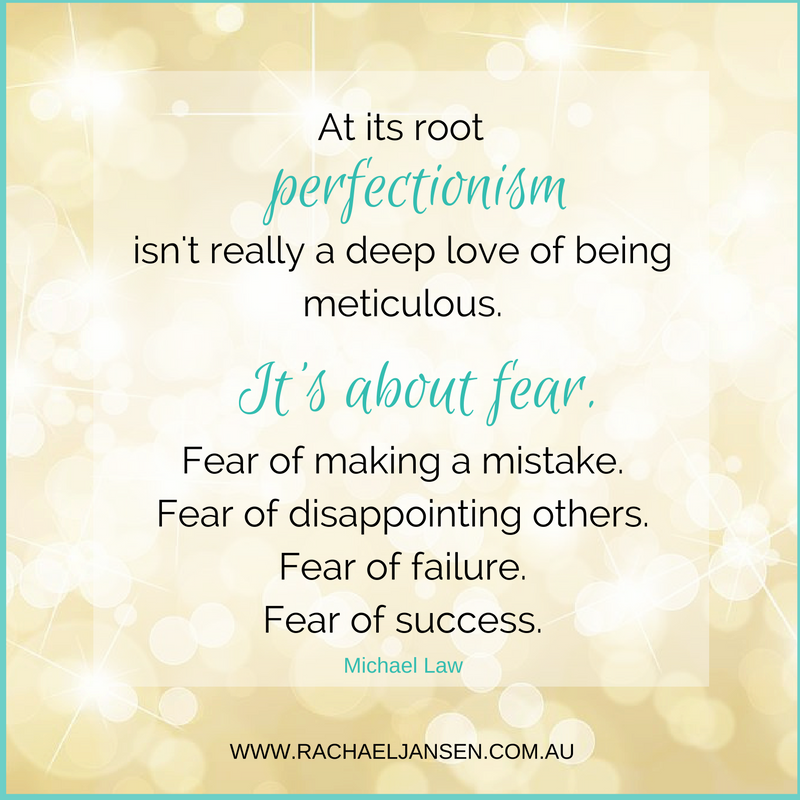When you feel like you’re never doing a good enough job, perhaps the time has come to ask yourself: who are you trying to impress?
So many mothers today are plagued by perfectionism, and are always trying to prove they can manage some perfect standard of motherhood and life. It sees you say yes to a multitude of pressures and commitments you’d rather do without and then stretch yourself trying to actually pull it all off.
If you fail to reach this lofty height, or fall short of where you think you should be, you end up suffering guilt, shame and remorse, which you then use to set yourself up for more punishment.
Driving all of this though, isn’t necessarily a desire to excel for personal accomplishment, but rather a misguided sense that you must prove yourself to be considered worthy by others.
When you free yourself of perfectionism, or find a way to recognise it, you realise you are already worthy – you are enough just as you are – and life becomes more enjoyable and less taxing. Perfectionism holds you back – it limits you. Acceptance gives you wings.

I always looked on my perfectionism as part of my nature as a high-achiever. I have worn this trait as a badge of honour for all of my adult life. I was proud of my ability to reach a high standard, and have pushed myself to maintain a level of achievement in all areas of my life, but to the detriment of my own health.
The saying ‘near enough is good enough’ was never enough for me. I considered it a cop out, laziness and poor form. And when I saw other people around me taking the cop out and leaving the extra work for people like me, it would send me into a mild fury of indignation. I now see that my ‘enough’ is actually enough. That there is a level of being good enough that is not perfect, but perfectly fine.
There’s a difference between doing your best, and trying to meet a standard that is impossible to reach. For some time I decided I was a recovering perfectionist – that I was going to get rid of these tendencies and become a bit zen about achievement. I’ve found though that I will always strive for my best, and that it’s been better for me to question why I’m trying to achieve some particular goal and if it really matters. Who am I trying to impress when I find myself stretched?
I interviewed Kirri White, life coach and author of e-program Making Peace with Perfectionism, on the subject and she says perfectionism is essentially approval-seeking behaviour.
“I used to think ‘I’m a recovering perfectionist’, but now I look at perfection as an ongoing journey of teaching and learning,” she says.
“It’s a belief system that if I look perfect, act perfect – if I am perfect – then I am lovable and will escape judgement.
“It is related to a sense of self-worth – if I fail I’m not worthy, not good enough.”
Kirri says practicing self-compassion when you notice your perfectionist tendencies helps to lower your expectations.
“Self-compassion for me is huge. You can get to the point where you beat yourself up for being a perfectionist.
“I’m not trying to fix myself. I know I still have a tendency towards perfectionism. In some areas I’m not as extreme but I no longer give myself a hard time over it.
“I see it as an opportunity to practice self-compassion.
“I think we all have our areas we can work on, but we’re not broken, not messed up. There’s a huge difference between the pursuit of excellence and perfectionism.
“I get a sense of personal satisfaction from doing my personal best, but it’s a sense of understanding that my best is good enough,” she says.
So the key here is the word ‘enough’ – you are enough just as you are, as am I. Just as it’s helped take the pressure off me, I’ve found it’s a lesson that has helped me with the kids too – I want them to know they are enough just as they are and that they are not defined by their grades, reports or sporting ability. We are all simply enough and deserving just the way we are.
When we feel the need to prove ourselves time and time again, we are never satisfied, prone to depression and anger, and fail to nurture and care for ourselves. Learning acceptance though, allows you to let go and truly appreciate yourself and your life.
![c76ff80f3abd86b75fe0f042203683ef[1]](http://www.rachaeljansen.com.au/wp-content/uploads/2013/11/c76ff80f3abd86b75fe0f042203683ef1-150x150.jpeg) Thanks to Kirri for the chat. You can find her at her website and on Facebook.
Thanks to Kirri for the chat. You can find her at her website and on Facebook.
Is the juggle of doing everything driving you insane?
Take the Juggle Survival training – shortcuts to health & happiness for women doing it all.





